Market Signals Summary:
The IBH stock market model is out of the market. The MAC stock market model is invested, the bond market model avoids high beta (long) bonds, the yield curve is steepening, the gold model is not invested, but the silver model is invested. The recession indicators COMP and iM-BCIg are both a bit higher from last week’s level. MAC-AU is also invested.
Stock-markets:
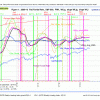 The IBH-model is out of the market as shown in Fig. 1. A sell signal was generated 12 weeks ago when the WLIg_shortEMA moved below the WLIg_longEMA. Currently the WLIg_shortEMA indicator is just below WLIg_longEMA. If the sell signal was correct then WLIg_shortEMA should move decisively below WLIg_longEMA.
The IBH-model is out of the market as shown in Fig. 1. A sell signal was generated 12 weeks ago when the WLIg_shortEMA moved below the WLIg_longEMA. Currently the WLIg_shortEMA indicator is just below WLIg_longEMA. If the sell signal was correct then WLIg_shortEMA should move decisively below WLIg_longEMA.
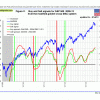 The MAC-US model stays invested. MAC-US Fig 2 shows the spreads of the moving averages, both levels about the same as last week. A sell signals is not imminent. The sell spread (red graph) has to move below the zero line for a sell signal.
The MAC-US model stays invested. MAC-US Fig 2 shows the spreads of the moving averages, both levels about the same as last week. A sell signals is not imminent. The sell spread (red graph) has to move below the zero line for a sell signal.
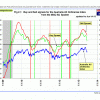 The MAC-AU model stays invested. MAC-AU Fig 2.1 shows the spreads of the moving averages of the Australia All Ordinaries Index, both of them lower from last week. A sell signals is not imminent, but the market may continue to move lower. The sell spread (red graph) has to move below the zero line for a sell signal. This model and its application is described in MAC-Australia: A Moving Average Crossover System for Superannuation Asset Allocations
The MAC-AU model stays invested. MAC-AU Fig 2.1 shows the spreads of the moving averages of the Australia All Ordinaries Index, both of them lower from last week. A sell signals is not imminent, but the market may continue to move lower. The sell spread (red graph) has to move below the zero line for a sell signal. This model and its application is described in MAC-Australia: A Moving Average Crossover System for Superannuation Asset Allocations
Bond-market:
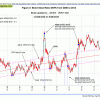 The BVR-model avoids high beta bonds (long-bonds) and also intermediate duration bonds.
The BVR-model avoids high beta bonds (long-bonds) and also intermediate duration bonds.
The Bond Value Ratio is shown in Fig 3. The BVR is unchanged from last week’s level, with the overall trend downwards. The chart shows the BVR over a shorter period than last week in order to depict the recent levels in more details. Excesses are never permanent, and when BVR will reach the long-term trendline then long-bond investors will have suffered considerable losses.
The Yield Curve:
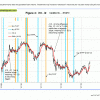 The yield curve model shows the steepening trend. Figure 4 charts (i10 – i2). The trend is up, as one can see. FLAT and STPP are ETNs. STPP profits from a steepening yield curve and FLAT increases in value when the yield curve flattens. This model confirms the direction of the BVR.
The yield curve model shows the steepening trend. Figure 4 charts (i10 – i2). The trend is up, as one can see. FLAT and STPP are ETNs. STPP profits from a steepening yield curve and FLAT increases in value when the yield curve flattens. This model confirms the direction of the BVR.
Recession:
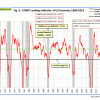 In Fig. 5 one can see that COMP is higher from last week’s level, and it is far away from signaling recession. COMP can be used for stock market exit timing as discussed in this article The Use of Recession Indicators in Stock Market Timing.
In Fig. 5 one can see that COMP is higher from last week’s level, and it is far away from signaling recession. COMP can be used for stock market exit timing as discussed in this article The Use of Recession Indicators in Stock Market Timing.
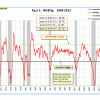 Fig. 5.1 shows our recession indicator iM-BCIg, which is also higher from last week’s level. iM-BCIg has now reached a level which was only exceeded 6.6% of the time since 1969. A recession is not imminent as one can clearly see.
Fig. 5.1 shows our recession indicator iM-BCIg, which is also higher from last week’s level. iM-BCIg has now reached a level which was only exceeded 6.6% of the time since 1969. A recession is not imminent as one can clearly see.
Please also refer to the BCI page
Gold:
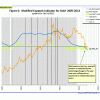 There is no buy-signal from the modified Coppock Gold indicator shown in Fig 6. This model has been out of Gold since Nov-26-2012. Gold would have to make a sustained move to $1700 and higher over the next few weeks for a buy signal according to my projections. This seems highly unlikely in view of the recent price decline. This indicator is described in Is it Time to Buy Gold Again? – Wait for the buy signal …….
There is no buy-signal from the modified Coppock Gold indicator shown in Fig 6. This model has been out of Gold since Nov-26-2012. Gold would have to make a sustained move to $1700 and higher over the next few weeks for a buy signal according to my projections. This seems highly unlikely in view of the recent price decline. This indicator is described in Is it Time to Buy Gold Again? – Wait for the buy signal …….
Silver:
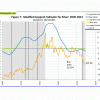 There was a buy-signal recently from the modified Coppock Silver indicator shown in Fig 7. The current price is a bit lower than the buy price. This indicator is described in Silver – Better Than Gold: A Modified Coppock Indicator for Silver
There was a buy-signal recently from the modified Coppock Silver indicator shown in Fig 7. The current price is a bit lower than the buy price. This indicator is described in Silver – Better Than Gold: A Modified Coppock Indicator for Silver

Georg: Peter Loaring here – I have been following your work for some time now and appreciate what you have presented. This is probably a stupid question but where on your web site do I find the weekly updates for the Best 10+/10 portfolios. Yesterday I saw that your site said there was a problem with the weekly update and therefore it wasn’t there but I can’t find that now. Thanks a lot.
Pete